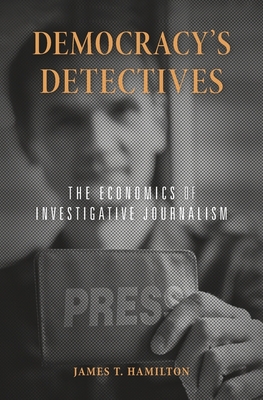

 Harvard University Press
Harvard University Press
Democracy's Detectives: The Economics of Investigative Journalism


Key Metrics
- James T Hamilton
- Harvard University Press
- Hardcover
- 9780674545502
- 9.4 X 6.4 X 1.2 inches
- 1.5 pounds
- Language Arts & Disciplines > Journalism
- English
 Secure Transaction
Secure TransactionBook Description
In democratic societies, investigative journalism holds government and private institutions accountable to the public. From firings and resignations to changes in budgets and laws, the impact of this reporting can be significant--but so too are the costs. As newspapers confront shrinking subscriptions and advertising revenue, who is footing the bill for journalists to carry out their essential work? Democracy's Detectives puts investigative journalism under a magnifying glass to clarify the challenges and opportunities facing news organizations today. Drawing on a painstakingly assembled data set of thousands of investigations by U.S. journalists, James T. Hamilton deploys economic theories of markets and incentives to reach conclusions about the types of investigative stories that get prioritized and funded.
Hamilton chronicles a remarkable record of investigative journalism's real-world impact, showing how a single dollar invested in a story can generate hundreds of dollars in social benefits. An in-depth case study of Pulitzer Prize-winning reporter Pat Stith of The News and Observer in Raleigh, NC, who pursued over 150 investigations that led to the passage of dozens of state laws, illustrates the wide-ranging impact one intrepid journalist can have. Important stories are going untold as news outlets increasingly shy away from the expense of watchdog reporting, Hamilton warns, but technology may hold an answer. Computational journalism--making novel use of digital records and data-mining algorithms--promises to lower the costs of discovering stories and increase demand among readers.
Author Bio
James T. Hamilton is the Hearst Professor of Communication, Chair of the Department of Communication, and Director of the Stanford Journalism Program.
His books on media markets and information provision include All the News That’s Fit to Sell: How the Market Transforms Information into News (Princeton, 2004), Regulation Through Revelation: The Origin, Politics, and Impacts of the Toxics Release Inventory Program (Cambridge, 2005), and Channeling Violence: The Economic Market for Violent Television Programming (Princeton, 1998). His most recent book, Democracy's Detectives: The Economics of Investigative Journalism (Harvard, 2016), focuses on the market for investigative reporting. Through research in the field of computational journalism, he is also exploring how the costs of story discovery can be lowered through better use of data and algorithms.
He is co-founder of the Stanford Computational Journalism Lab, Senior Fellow at the Stanford Institute for Economic Policy Research, affiliated faculty at the Brown Institute for Media Innovation, and member of the JSK Fellowships Board of Visitors.
For his accomplishments in research, he has won awards such as the David N Kershaw Award of the Association for Public Policy Analysis and Management, the Goldsmith Book Prize from the Kennedy School’s Shorenstein Center (twice), the Frank Luther Mott Research Award (twice), the Tankard Book Award, and a Center for Advanced Study in the Behavioral Sciences Fellowship.
Teaching awards from Harvard, Duke, and Stanford include the Allyn Young Prize for Excellence in Teaching the Principles of Economics, Trinity College Distinguished Teaching Award, Bass Society of Fellows, Susan Tifft Undergraduate Teaching and Mentoring Award, and School of Humanities and Sciences Dean's Award for Distinguished Teaching.
Prior to joining the Stanford faculty, Hamilton taught at Duke University’s Sanford School of Public Policy, where he directed the De Witt Wallace Center for Media and Democracy. He earned a BA in Economics and Government (summa cum laude) and PhD in Economics from Harvard University.
Education
Ph.D., Harvard University, Economics (1991)
B.A., Harvard University, Economics and Government (1983)
Source: Stanford University
Videos




Community reviews
Write a ReviewNo Community reviews